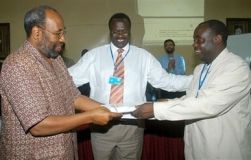South Sudan sees vast dividend in Uganda peace
Sept 5, 2006 (JUBA) – Still recovering from their own war that ended just last year, south Sudan is eyeing a new peace dividend from a potential halt to the long-running conflict in neighboring Uganda.
 Plagued by spillover from a two-decade war not of their making, southern Sudanese have high hopes for peace talks their region’s autonomous government is mediating here between Kampala and the rebel Lord’s Resistance Army.
Plagued by spillover from a two-decade war not of their making, southern Sudanese have high hopes for peace talks their region’s autonomous government is mediating here between Kampala and the rebel Lord’s Resistance Army.
Driven from hideouts in northern Uganda, LRA fighters have brought their insurgency here, raiding villages for food and medicine and terrorizing locals whose memories of Sudan’s 21-year, north-south civil war are still fresh.
“The LRA have haunted us like demons,” says Philip Kana, who fled Sudan’s conflict as a child but returned after Khartoum and the ex-rebel Sudan People’s Liberation Movement/Army (SPLM/A) signed a peace deal in January 2005.
“I left Sudan as a boy because of war here and went to Uganda,” says the 27-year-old southern Sudanese who sells flour in the regional capital of Juba.
“Then our war was solved and the LRA still fought,” Kana said. “They starve south Sudan and cut us off like an island.”
But a landmark truce between Kampala and the rebels that took effect only last week has already raised the confidence of many in this troubled region.
Although the peace talks are far from reaching a comprehensive settlement, the accord negotiated by the SPLM/A who now govern southern Sudan, appears to have boosted business and traffic once stifled by fears of the LRA.
“The situation was so bad in the past, and even last week you had to travel in convoy across the border,” said Zachariah Taban, 24, who sells biscuits and sweets from a stall on Juba’s main Uganda Road.
“Now all that is going to change,” he said.
“If the peace holds, it will mean a lot to business, because it will be so much easier and cheaper to get goods here,” Taban said. “But it will also mean much to me, because I can travel safely to see my family and friends.”
Southern Sudanese officials are equally hopeful of a dramatic improvement in the security situation, which they were denied after peace with Khartoum when the LRA began to be pushed north into their territory by the Ugandan army.
“The conflict has affected as large an area in south Sudan as in the north of Uganda,” said David Nailo Mayo, a member of the government and chairman of the Southern Sudan Reconstruction and Development Fund.
“The LRA used vindictive tactics, going into a village and burning and killing indiscriminately, inhumane acts against any rule of war,” he said, referring to the rebels’ notoriously brutal tactics.
Fear of abduction, mutilation, rape and murder at the hands of the rebels has been a major source of delay in development projects in south Sudan as well as frustration for the region’s new leaders, Mayo said.
“If, God willing, there is peace, it will be a major help for development and allow south Sudan to concentrate on reconstruction,” he said. “The fighting did great damage in both human and economic terms.”
Landlocked with roads overgrown or mined, bridges broken and threatened by marauding LRA fighters, and the route north via the Nile open only now to small boats, the region depends on most goods to be flown in at enormous cost.
Removing the LRA from the area through a settlement that allows them to return to Uganda is therefore key to opening up commerce and human traffic.
“It will be a huge boost to mobility, allowing the roads to be cleared of mines and making a safe passage to Uganda,” said Mayo, who is eagerly pushing for the reconstruction of the main overland link between Sudan and Uganda.
Optimism over the peace talks has pushed the project to the top of agenda for international donors and aid workers who are about halfway through a massive 183-million-dollar (142-million-euro) road rehabilitation programme.
“The road is an umbilical link between Uganda and south Sudan,” said Justin Bagirishya, head of the UN World Food Programme (WFP) here. “We are now pushing for that road to be given top priority for mine clearance and rehabilitation.”
“When, or if, the LRA disarm, it would be a good opportunity to press ahead so the region has all the benefits of peace,” he said, noting it will encourage investment, cut import costs and improve market and health care access.
While it is still too early to tell if the peace talks will succeed in ending the war in Uganda that has killed tens of thousands and displaced nearly two million, they have already had an impact on civilians here.
“Levels of confidence and security have increased,” said Professor Hizkias Assefa, chief international mediator at the Juba talks and coordinator of the Africa Peacebuilding and Reconciliation Resources organization.
“IDPs (Internally Displaced People) are beginning to expand their farms, while others are returning home,” he said.
And for south Sudan, peace in northern Uganda will bring with it a happy by-product at home.
“We want to bring people back to their homes,” said Mayo of the Southern Sudan Reconstruction and Development Fund. “But they can’t come when the road is not safe and they can’t when the neighbouring country is at war.
“That is why we need the peace.”
(ST/AFP)
